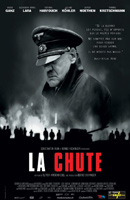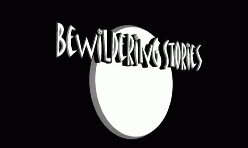Oliver Hirschbiegel, director:
La Chute
(Untergang ; Downfall )
reviewed by Paule Libby

|
La Chute Director: Oliver Hirschbiegel Company: Constantin Film Time: 2h 30m Starring: Bruno Ganz, Juliane Kohler, Alexandra Maria Lara, Thomas Kretschmann French release: January 5, 2005 |
|
J’ai profité de mon séjour dans la capitale pour aller voir trois films :
The Grudge (film d’épouvante américain-japonais de Takashi Shimizu) |
During my visit to Paris, I took the opportunity to see three films:
The Grudge, a Japanese-American horror film by Takashi Shimizu. | |
| Parmi les trois, je vous parlerai surtout de La Chute, qui est, selon moi, un chef-d’oeuvre. On avait parlé sur Entramis de l’accueil plutot mitigé que ce film avait reçu en Allemagne. La critique française, quant à elle, est unanime pour dire que ce film est tout à fait exceptionnel. | Of the three, I’ll tell you especially about Downfall, which I think is a masterpiece. The Entramis discussion list has already talked about the film’s rather mixed reception in Germany. In France, critics are unanimous in saying that the film is truly outstanding. | |
| Sa particularité réside dans le fait que le portrait d’Hitler se base sur le témoignage de sa secrétaire particulière, Traudl Junge, une jeune fille de 22 ans à l’époque. Cette vision personnelle, renforcée à la fin du film par une récente et brève interview de Junge qui a aujourd’hui plus de 75 ans, donne au film son originalité et son ambiance presque intimiste. | What makes the film special is that the portrayal of Hitler is based on the account of his private secretary, Traudl Junge, who was a girl of 22 at the time. Her personal viewpoint is supported at the end of the film by a recent, brief interview with Junge, who is now more than 75 years old; it makes the film original and gives it an almost intimate atmosphere. | |
| Traudl Junge restera fascinée jusqu’au bout par ce personnage. Il est un peu pour elle la figure omnipotente du père, l’autorité absolue. Elle est convaincue de la « mission » d’Hitler qui doit mener le peuple allemand à la grandeur suprème. Elle ne quittera le bunker qu’après le suicide du Fuehrer et d’Eva Braun (devenue juste avant sa mort et après une cérémonie de mariage express, Madame Hitler), et celui de toute la famille Goebbels. | Traudl Junge is utterly fascinated by the character of Hitler. For her, he is something of an omnipotent father figure who has absolute authority. She is convinced of Hitler’s “mission” to lead the German people to supreme power. She leaves the bunker only after the Führer and Eva Braun — along with the entire Goebbels family — have committed suicide. Just before her death, Eva Braun became Mrs. Hitler in a hasty wedding ceremony. | |
| Pourtant, l’attachement inconditionnel et affectif de la secrétaire connaitra des failles, sera entaché par le doute, la tristesse, et finalement le désespoir et l’horrible réalité. C’est alors un Hitler fanatique que l’on voit se dessiner, un homme qui, jusqu’au bout, ne veut pas capituler. Les Russes sont aux portes de Berlin et lui continue à convoquer ses généraux et à élaborer les plans stratégiques les plus extravagants, pret à sacrifier le peuple allemand et tous les civils qui se font massacrer. Il rentre dans la folie pure devant les mines inquiètes de ses généraux impuissants et abasourdis par les propos de leur chef. | However, the secretary’s unconditional emotional attachment begins to crack under the impact of doubt, sadness, and finally dispair and horrible reality. That’s when we begin to see a fanatical Hitler who refuses to yield, even to the bitter end. The Russians are on the outskirts of Berlin, and yet he continues to summon his generals and draw up the most outlandish strategies; he is ready to sacrifice the German people and all the civilians who are being slaughtered. He lapses into pure madness as his generals watch anxiously and helplessly, stunned at the words of their leader. | |
| Loin de tous les excès et des portraits manichéens, ce film réussit un portrait tout en nuances. Hitler n’est pas uniquement le Mal absolu mais un homme détruit, cassé, vulnérable. On se prend meme à ressentir de la pitié pour cet homme qui avait une certaine idée du destin de son pays et qui n’est plus qu’une marionnette, dépassé par le cours de l’histoire, terriblement vieilli et malade. | In no way does the film lapse into excess or black-and-white caricature. Rather, it succeeds by painting a portait in shaded tones. Hitler is not merely absolute Evil, he is man who is destroyed, broken and vulnerable. One even begins to feel pity for this man who had a vision of his country’s destiny and who is now only a puppet — terribly aged and ill — that history has left behind. | |
| Il faut aussi saluer l’extraordinaire performance de Bruno Ganz. Il est selon moi, le meilleur interprete que le role d’Hitler ait pu avoir dans l’histoire du cinéma. Ganz, l’un des plus grands acteurs de cinéma et théatre allemand (il a joué, entre autres, dans les films de Rohmer et de bien d’autres metteurs en scène français et italiens, dans ceux de Wim Wenders, de Peter Handke, de Werner Herzog, de Schloendorff, etc., etc.) maîtrise le rôle à merveille, exceptionnel de sensibilité. | Bruno Ganz deserves all praise for an extraordinary performance. I think his portrayal of Hitler is the best in the history of film. Ganz is one of the greatest actors in German cinema and theater. He has appeared in, among others, the films of Eric Rohmer and many other French and Italian directors, and in the films of Wim Wenders, Peter Handke, Werner Herzog, Schloendorff, etc. He has mastered the role marvelously and is outstanding in his sensitivity. | |
| Intéressant aussi les mots de Traudl Junge, dans l’interview, à la fin du film. Elle déclare qu’aujourd’hui, avec le recul du temps, elle se rend compte de son extraordinaire naiveté de l’èpoque. C’est en connaissant plus tard l’histoire des Geschwister Scholl et de la Rose Blanche (mouvement munichois de résistance au nazisme incarné par les jeunes étudiants Hans et Sophie Scholl (ils avaient l’âge de Junge) — ils seront décapités par les Nazis en 43) qu’elle prendra réellement conscience de sa propre légèreté face à son attachement envers Hitler. «La jeunesse n’excuse pas tout» dit-elle. | Also interesting: the words of Traudl Junge, in her interview at the end of the film. She says that today, with the benefit of hindsight, she realizes how extraordinarily naive she was at the time. Only when she later became aware of the story of the Scholls and of the White Rose — an anti-Nazi resistance movement in Munich led by the young students Hans and Sophie Scholl, who were the same age as Traudl Junge and beheaded by the Nazis in 1943 — did she realize how shallow-minded she had been in her attachment to Hitler. “Youth does not excuse everything,” she says. | |
|
Je vous conseille vivement d’aller voir ce film : 2 heures 30 qui passent très, très vite, tant le rythme et l’émotion sont intenses.
© 2005, Paule Libby |
I urge you to see this film; the pace and emotion are so intense that two and a half hours go by very quickly indeed.
Translation © 2005 by Don Webb |
|

